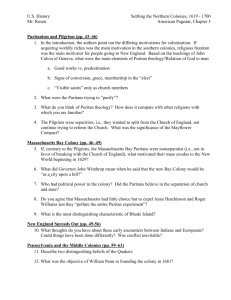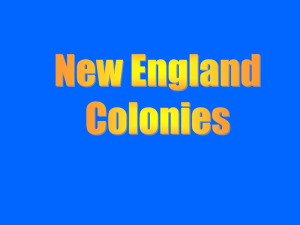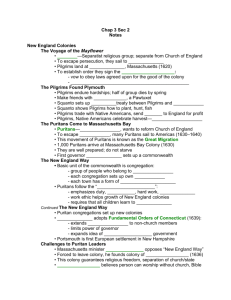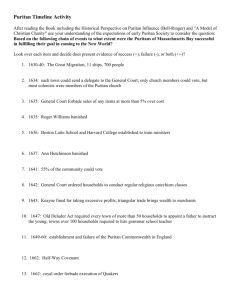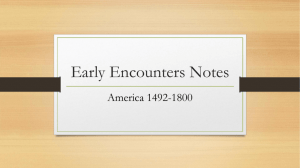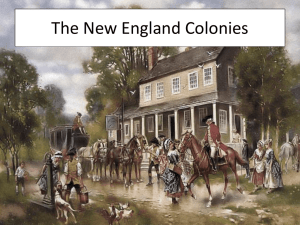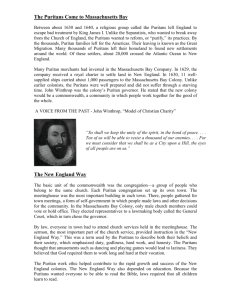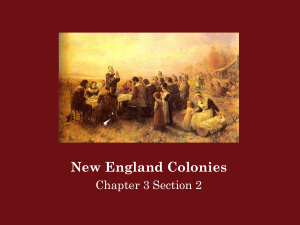Unit_2_-_The_American_Colonies_
advertisement
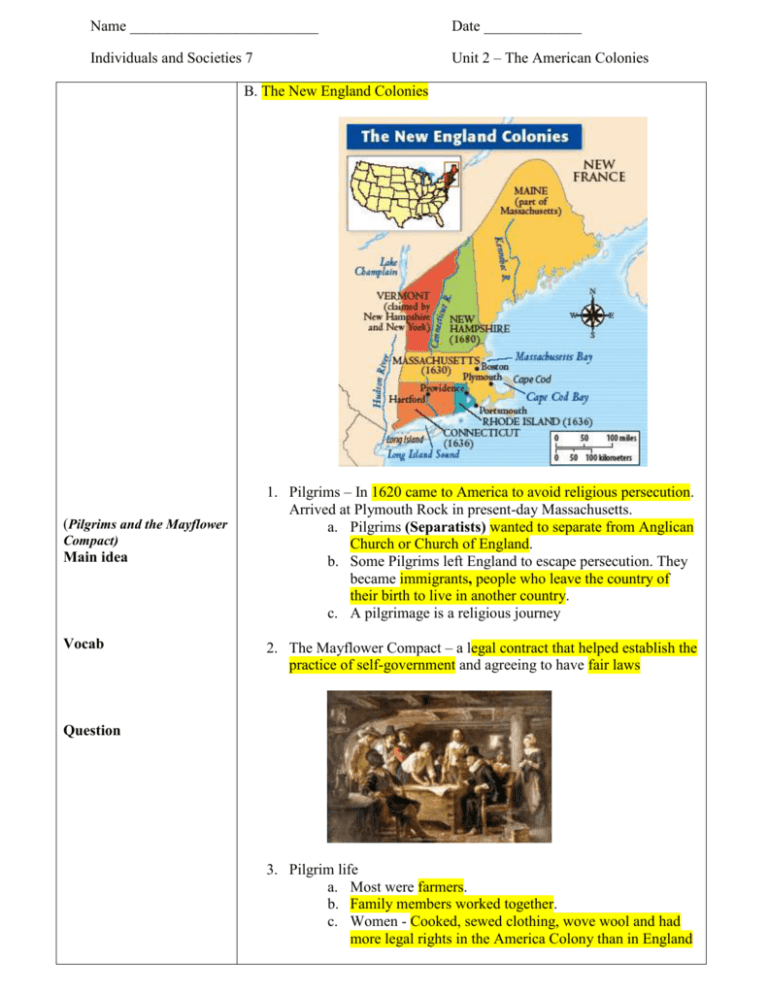
Name _________________________ Date _____________ Individuals and Societies 7 Unit 2 – The American Colonies B. The New England Colonies (Pilgrims and the Mayflower Compact) Main idea Vocab 1. Pilgrims – In 1620 came to America to avoid religious persecution. Arrived at Plymouth Rock in present-day Massachusetts. a. Pilgrims (Separatists) wanted to separate from Anglican Church or Church of England. b. Some Pilgrims left England to escape persecution. They became immigrants, people who leave the country of their birth to live in another country. c. A pilgrimage is a religious journey 2. The Mayflower Compact – a legal contract that helped establish the practice of self-government and agreeing to have fair laws Question 3. Pilgrim life a. Most were farmers. b. Family members worked together. c. Women - Cooked, sewed clothing, wove wool and had more legal rights in the America Colony than in England 4. Thanksgiving a. Pilgrims had barely survived the first winter. They needed help planting crops in a different climate and geography. b. They received help from local Native Americans. c. Squanto taught Pilgrims to fertilize soil and plant native crops. d. Pilgrims celebrated harvest with the Wampanoag Native Americans. (Puritans and Puritan Life) Main idea 5. Puritans - dissenters who disagreed with the Church of England. a. The Great Migration – Over 20,000 Puritan immigrants left England from 1629 to 1640. b. Puritan colonists led by John Winthrop went to Massachusetts to seek religious freedom. c. Established Massachusetts Bay Colony. d. Puritans founded Boston, the most important town in New England. Vocab Question (Puritan Dissenters) Main idea Vocab Question 6. Puritan Life a. The New England Way - Set up self-governing churches called Congregationalists b. Puritans Values on Religion improved their society 1. Hard work - was a way to honor god and Puritan society improved and grew rapidly 2. Education – everyone had to read the Bible, laws required children to read 3. Representative Government – brought ideas of town meetings and self-government with them to America 7. Puritan Dissenters – people who disagreed with the church were treated poorly. Puritans were intolerant of other religious ideas. a. Roger Williams – was banished from Massachusetts when he disagreed with Puritans. He fled south a founded the Colony of Rhode Island 1. Rhode Island guaranteed religious toleration and separation of Church and State b. Anne Hutchinson – fled to Rhode Island after she was banished from the colony when she believed the clergy were not part of the “elect” or those chosen by God c. John Wheelhouse – Anne’s brother in law who fled the colony to New Hampshire d. Quakers – Protestants who were persecuted by the Puritans. Quakers were jailed, whipped, banished and in some cases executed for dissention. Many Quakers will move to Pennsylvania to practice their religion. How did religion play a role in creating the New England Colonies? ____________________________________________________________ ____________________________________________________________ C. New England Life (Common Culture) Main idea Vocab Question 1. Common Culture a. Came from eastern England counties b. Most were religious dissenters who disagreed with catholic and Anglican practices c. Most were Puritan but also had Quakers, Separatists and Baptists d. Many were highly skilled and educated e. Traveled with “companies” (friends, families, neighbors) f. Established democratic principles and self-government 2. Geography and Natural Resources 1. Fishing Industry – export mackerel, halibut, cod, herring 2. Whaling Industry – used for oil 3. Forests – Oak trees to build ships, white pines for masts, export timber 4. Ships – New England ships became an important part of international trade What resources would you find in Massachusetts? ___________________________________________________________ (Farming and Economy) Main Idea Question 3. Farming - was not easy to do in New England because of short growing seasons, long winters and rocky soil a. Most farms were small b. Subsistence farming – growing just enough to feed your family 4. Economy – the way in which people make a living. What products or services they provide. a. Farmers sold crops at the common or public lands b. Shopkeepers sold products to make a living c. Exported fish, ships and lumber along the coasts d. Colonists began to compete with England’s fishermen, shipbuilders and merchants. e. Coastal towns like Boston, Salem and Newport became very rich Summary Explain how New England’s geography and natural resources impacted their way of life? MUST USE THESE TERMS Geography Natural Resources Economy (Jobs) Fishing Ships Exporting ___________________________________________________________ ___________________________________________________________ ___________________________________________________________ ___________________________________________________________ ___________________________________________________________ ___________________________________________________________ ___________________________________________________________ ___________________________________________________________ ___________________________________________________________ ___________________________________________________________ ___________________________________________________________ ___________________________________________________________ __________________________________________________________ ___________________________________________________________ __________________________________________________________ ___________________________________________________________ __________________________________________________________ ___________________________________________________________ __________________________________________________________ ___________________________________________________________ __________________________________________________________ __________________________________________________________
